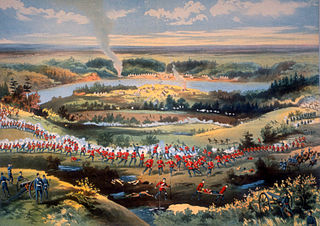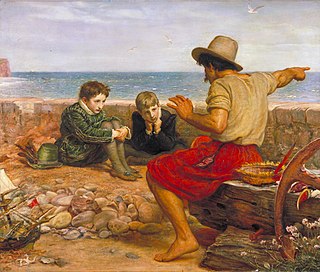Related Research Articles

The North-West Rebellion, also known as the North-West Resistance, was an armed resistance movement by the Métis under Louis Riel and an associated uprising by First Nations Cree and Assiniboine of the District of Saskatchewan against the Canadian government. Many Métis felt that Canada was not protecting their rights, their land, and their survival as a distinct people.

Storytelling is the social and cultural activity of sharing stories, sometimes with improvisation, theatrics or embellishment. Every culture has its own stories or narratives, which are shared as a means of entertainment, education, cultural preservation or instilling moral values. Crucial elements of stories and storytelling include plot, characters and narrative point of view. The term "storytelling" can refer specifically to oral storytelling but also broadly to techniques used in other media to unfold or disclose the narrative of a story.
First Nations is a term used to identify Indigenous peoples in Canada who are neither Inuit nor Métis. Traditionally, First Nations in Canada were peoples who lived south of the tree line, and mainly south of the Arctic Circle. There are 634 recognized First Nations governments or bands across Canada. Roughly half are located in the provinces of Ontario and British Columbia.

The Métis are an Indigenous people whose historical homelands include Canada's three Prairie Provinces, as well as parts of British Columbia, the Northwest Territories, Northwest Ontario and the northern United States. They have a shared history and culture, deriving from specific mixed European and Indigenous ancestry, which became distinct through ethnogenesis by the mid-18th century, during the early years of the North American fur trade.
Indspire, formerly known as the National Aboriginal Achievement Foundation (NAAF), is a national Indigenous registered charity that invests in the education of Indigenous people for the long-term benefit of these individuals, their families and communities, and Canada.
The Gabriel Dumont Institute (GDI), formally the Gabriel Dumont Institute of Native Studies and Applied Research Inc., is a non-profit corporation serving the educational and cultural needs of the Saskatchewan Métis and Non-Status Indian community, and is the officially-designated education arm of the Métis Nation—Saskatchewan (MN-S).

A 19th century community of the Métis people of Canada, the Anglo-Métis, more commonly known as Countryborn, were children of fur traders; they typically had Scots, or English fathers and Indigenous mothers, often Cree, Anishinaabekwe, Nakoda, amongst others. They were also known as "English halfbreeds." Some Anglo-Metis still identify by this name. Their first languages were generally those of their mothers: Cree, Saulteaux, Assiniboine, etc. and English. Some of their fathers spoke Gaelic or Scots, leading to the development of the creole language known as "Bungee". Some scholars have started spelling Métis as "Metis" to acknowledge the presence and contributions of the Anglo-Métis and the complex history of the Métis people overall.
Historica Canada is a Canadian charitable organization dedicated to promoting the country's history and citizenship. All of its programs are offered bilingually and reach more than 28 million Canadians annually.
Maria Campbell is a Métis author, playwright, broadcaster, filmmaker, and Elder. Campbell is a fluent speaker of four languages: Cree, Michif, Western Ojibwa, and English. Four of her published works have been published in eight countries and translated into four other languages. Campbell has had great influence in her community as she is very politically involved in activism and social movements. Campbell is well known for being the author of Halfbreed, a memoir describing her own experiences as a Métis woman in society and the difficulties she has faced, which are commonly faced by many other women both within and outside of her community.
The Sixties Scoop, also known as The Scoop, was a period in which a series of policies were enacted in Canada that enabled child welfare authorities to take, or "scoop up," Indigenous children from their families and communities for placement in foster homes, from which they would be adopted by white families. Despite its name referencing the 1960s, the Sixties Scoop began in the mid-to-late 1950s and persisted into the 1980s.
Katherena Vermette is a Canadian writer, who won the Governor General's Award for English-language poetry in 2013 for her collection North End Love Songs. Vermette is of Métis descent and originates from Winnipeg, Manitoba. She was an MFA student in creative writing at the University of British Columbia.
Chelsea Vowel, who often writes as âpihtawikosisân, is a Métis writer, professor, and lawyer from near Lac Ste. Anne, Alberta, whose work focuses on language, gender identity, and cultural resurgence. She has been published in the Huffington Post, The National Post, and The Globe and Mail. Co-host of the podcast Métis in Space and runner of the IndigenousXca Twitter account, Vowel has been noted as a "prominent and respected Métis blogger" and "one of the most visible of [the] new generation" of Métis intellectuals.

Cherie Dimaline is a Métis writer from the Georgian Bay Métis Nation, a federally recognized community in Ontario. She has written a variety of award-winning novels and other acclaimed stories and articles. She is most noted for her 2017 young adult novel The Marrow Thieves, which explores the continued colonial exploitation of Indigenous people.

The Indigenous Peoples Atlas of Canada is an English and French educational resource created by the Royal Canadian Geographical Society, published by Canadian Geographic, and funded by the Government of Canada. It was created to address calls to action from the Truth and Reconciliation Commission, among them the development of "culturally appropriate curricula" for Aboriginal Canadian students. Its content includes information about indigenous lands, languages, communities, treaties, and cultures, and topics such as the Canadian Indian residential school system, racism, and cultural appropriation.

Indigenous law in Canada refers to the legal traditions, customs, and practices of Indigenous peoples and groups. Canadian aboriginal law is different from Indigenous Law. Canadian Aboriginal law provides certain constitutionally recognized rights to land and traditional practices.
Susan D. Dion (Potawatomi-Lenapé) is professor at York University in the Faculty of Education. Dion specializes on issues related to Indigenous matters in education and the role of Indigenous relationships in teacher education.
Deanna Helen Reder is a Cree-Métis associate professor of English and the Chair of Indigenous Studies at Simon Fraser University. Reder was elected a member of the College of New Scholars of the Royal Society of Canada in 2018. As a faculty member at Simon Fraser University, she was a founding member of the Indigenous Literary Studies Association (ILSA) and served on the council from 2015 to 2018. In 2019 she helped establish the Indigenous Editors Association (IEA) and served as its "Past-President" from 2020 to 2021.

The Métis Nation of Ontario (MNO) is an organization for people who self-identify as Métis in Ontario. It consists of representatives at the provincial and local levels. On June 27, 2019, the Métis Nation of Ontario and the Government of Canada signed the MNO-Canada Métis Government Recognition and Self-Government Agreement. Herein, Canada recognizes for the first time in history that the Métis communities represented by the MNO hold the inherent right to self-government and self-determination.
Pretendian is a pejorative colloquialism used to call out a person who has falsely claimed Indigenous identity by professing to be a citizen of a Native American or Indigenous Canadian tribal nation, or to be descended from Native American or Indigenous Canadian ancestors. As a practice, being a pretendian is considered an extreme form of cultural appropriation, especially if that individual then asserts that they can represent, and speak for, communities from which they do not originate. It is sometimes also referred to as a form of fraud, ethnic fraud or race shifting.
References
- ↑ "Say Magazine". Industry Canada. Retrieved 24 July 2015.